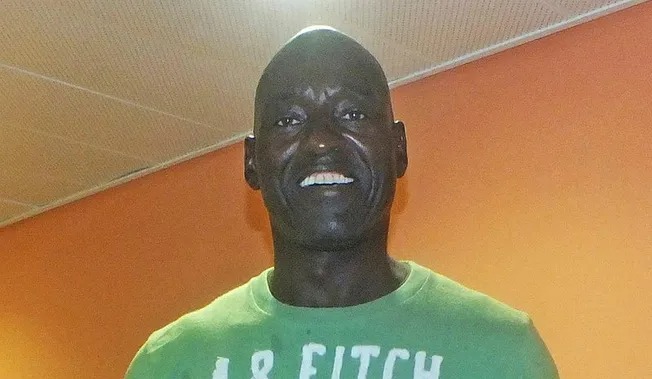How a Black Jew from Alabama became an Israeli basketball legend
Willie Sims excelled on defense in his 15 seasons in Israel, after suffering both antisemitism and racism in college at Louisiana State. He died last week at 64

Willie Sims. During his two years at Maccabi Haifa he averaged over 20 points per game. Courtesy of Wikimedia Commons
This article originally appeared on Haaretz, and was reprinted here with permission. Sign up here to get Haaretz’s free Daily Brief newsletter delivered to your inbox.
Willie Sims, an American-born star of Israeli basketball in its adolescence – and rare for the local game, a Jewish-born foreigner – died Friday at 64.
The Alabama-born Sims, who had suffered a heart attack in August, was one of the leading players in Israel’s Premier League, and played for 15 seasons in the 1980s and early ’90s for Maccabi Haifa, Hapoel Tel Aviv, Elitzur Netanya, Maccabi Tel Aviv, Hapoel Eilat and Maccabi Hadera.
Unlike many Americans at the time, who converted in order to play as Israelis, Sims was a Jew from birth – his mother was born to a Jewish father named Jack Miller, and her mother had converted.
Sims’ parents divorced when he was 5, and he was raised as a Reform Jew by his grandmother in Queens, New York. Sims attended synagogue until adolescence, and when he studied at Louisiana State University he encountered both racism and antisemitism. Someone once wrote on the door to his room: “Black and Jewish, why are you in Louisiana?”
At 19, after graduating from Long Island City High School, Sims arrived in Israel with the U.S. team for the 10th Maccabiah Games. He shot the two free throws that led to a 92-91 victory over Israel in the finals.
After completing college he won another gold medal at the Maccabiah, and despite being drafted by the NBA, he accepted an offer to join Maccabi Haifa in the summer of 1981, along with his teammate David Blatt – whose later head-coaching career would include Maccabi Tel Aviv and the Cleveland Cavaliers.
Sims soon became an Israeli for all intents and purposes. He served an abbreviated stint in the army and married a Jewish woman named Ariela in a civil wedding in Cyprus. The couple had two sons and a daughter, Danyelle, a model who married Gal Mekel, who played for two teams in the NBA.
Sims had a unique ability to adapt to his team’s needs. During his two years at Maccabi Haifa he averaged over 20 points per game. On his next team, Hapoel Tel Aviv, his numbers declined, but in the 1985-86 season he was the leading scorer for Elitzur Haifa, a surprise participant in the playoff finals.
During five seasons at Maccabi Tel Aviv from 1988 to 1992, Sims played second fiddle to high scorers Kevin Magee and Doron Jamchi.
He often played center, though he was a classic guard and excelled mainly on defense. His best-remembered play was a block of a shot by Barcelona’s Juan Antonio San Epifanio, helping seal a come-from-behind victory in February 1992.
Maccabi Tel Aviv chose to part from Sims at the end of that season, and at his next stop, Hapoel Eilat, he scored in the double digits once again. He finished his 15 seasons in the Premier League with 3,761 points, the 47th top scorer in Israeli basketball history, averaging 12.2 points per game. In the playoffs he ranked 15th at 842 points, 11.1 per game.
When he retired at 38, he was appointed assistant coach at Maccabi Hadera of the National League, but amid a shortage of players he agreed to suit up for games until he was 41.
After he retired for good, he took a fitness training course in the United States and started a studio and a club for children in Karkur north of Tel Aviv. He served as a fitness coach and an assistant coach at Elitzur Netanya, and played for several years with the Maccabi Tel Aviv veterans.
“Willie was always a fighter and an athlete with a wonderful smile, who won five championships in five seasons with the Yellows, three Israeli State Cups, and participated in the European Final Four three times,” Maccabi Tel Aviv said in a statement.
Shimon Mizrahi, the team’s chairman, added that “Willie was a great soul. A player with all his heart and soul, a model athlete who with his sportsmanlike spirit spurred on others.”
Shmuel Frenkel, the co-chairman of Israeli basketball’s Super League, said, “I remember Willie as a great defensive player, a player for special missions without an ego and with a rare fighting spirit and a radiant personality.”
The Forward is free to read, but it isn’t free to produce

I hope you appreciated this article. Before you go, I’d like to ask you to please support the Forward.
Now more than ever, American Jews need independent news they can trust, with reporting driven by truth, not ideology. We serve you, not any ideological agenda.
At a time when other newsrooms are closing or cutting back, the Forward has removed its paywall and invested additional resources to report on the ground from Israel and around the U.S. on the impact of the war, rising antisemitism and polarized discourse.
This is a great time to support independent Jewish journalism you rely on. Make a gift today!
— Rachel Fishman Feddersen, Publisher and CEO
Support our mission to tell the Jewish story fully and fairly.
Most Popular
- 1

Fast Forward Ye debuts ‘Heil Hitler’ music video that includes a sample of a Hitler speech
- 2

Opinion It looks like Israel totally underestimated Trump
- 3

Culture Is Pope Leo Jewish? Ask his distant cousins — like me
- 4

Fast Forward Student suspended for ‘F— the Jews’ video defends himself on antisemitic podcast
In Case You Missed It
-

News In Edan Alexander’s hometown in New Jersey, months of fear and anguish give way to joy and relief
-

Fast Forward What’s next for suspended student who posted ‘F— the Jews’ video? An alt-right media tour
-

Opinion Despite Netanyahu, Edan Alexander is finally free
-

Opinion A judge just released another pro-Palestinian activist. Here’s why that’s good for the Jews
-
Shop the Forward Store
100% of profits support our journalism
Republish This Story
Please read before republishing
We’re happy to make this story available to republish for free, unless it originated with JTA, Haaretz or another publication (as indicated on the article) and as long as you follow our guidelines.
You must comply with the following:
- Credit the Forward
- Retain our pixel
- Preserve our canonical link in Google search
- Add a noindex tag in Google search
See our full guidelines for more information, and this guide for detail about canonical URLs.
To republish, copy the HTML by clicking on the yellow button to the right; it includes our tracking pixel, all paragraph styles and hyperlinks, the author byline and credit to the Forward. It does not include images; to avoid copyright violations, you must add them manually, following our guidelines. Please email us at [email protected], subject line “republish,” with any questions or to let us know what stories you’re picking up.















